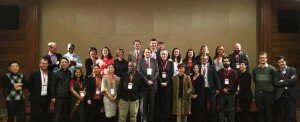 According to recent projections, the worldwide urban population will increase to more than 70% by 2050. Accompanied by continuous and uncontrolled urban growth, this development poses one of the major infrastructure, climate, and environmental challenges of today’s world. Especially in developing countries and emerging economies, innovative ideas and creative thinking need to be combined with traditional planning approaches to ensure sustainable development and to tackle manifold challenges associated with rapid urbanisation processes. In order for decision-makers and urban thinkers to break out of conventional ways of thinking, the Global Leadership Academy introduced the Urban Innovation and Leadership Lab. The workshop series aims at assisting urban leaders from around the world in gaining new perspectives on urban development, learning essential new skills, discussing pressing topics, sharing their knowledge and co-creating solutions for current and future urban challenges in their home countries. These objectives can be achieved through a cutting-edge innovation and leadership development process and learning in multidisciplinary and diverse international teams.
According to recent projections, the worldwide urban population will increase to more than 70% by 2050. Accompanied by continuous and uncontrolled urban growth, this development poses one of the major infrastructure, climate, and environmental challenges of today’s world. Especially in developing countries and emerging economies, innovative ideas and creative thinking need to be combined with traditional planning approaches to ensure sustainable development and to tackle manifold challenges associated with rapid urbanisation processes. In order for decision-makers and urban thinkers to break out of conventional ways of thinking, the Global Leadership Academy introduced the Urban Innovation and Leadership Lab. The workshop series aims at assisting urban leaders from around the world in gaining new perspectives on urban development, learning essential new skills, discussing pressing topics, sharing their knowledge and co-creating solutions for current and future urban challenges in their home countries. These objectives can be achieved through a cutting-edge innovation and leadership development process and learning in multidisciplinary and diverse international teams.
The Urban Innovation and Leadership Lab consists of three face-to-face modules that were hosted in three major cities and world regions: Durban (South Africa), Berlin (Germany) and Shanghai (PR China). Within the scope of the three modules, international leaders, who are working on different aspects of future challenges with regard to urban life and development, from Asia, Latin America, Africa and Europe, were brought together. During the third module, which took place from 9-11 March 2016 at Tongji University in Shanghai, the participants branched out into three teams to work on solutions to specific questions in the three key areas: sanitation, urban transport, and community participation.
While the participants advanced their leadership capacities by using methods of design thinking during the three day workshop, they had the opportunity to listen to two presentations given by distinguished experts from Tongji University on the first day of the Urban Innovation and Leadership Lab. The Director of the Overseas and Business Department, Dr. Su Yunsheng, spoke about the future of the city as well as about expected changes in city governance: on one hand, urban dwellers will live in an advanced technological environment, where the interests of the well-being of the community will be highly prioritised. On the other hand, the city governance concepts will be shifted from PEST (Policy Economy Social Technology) to STEP (Socio Technology Economy Policy). With other words, social and technological benefits will be prioritised instead of the contemporary drivers of a city’s development – policy and economy. Prof. Zhang Shangwu, Vice Dean of the College of Architecture and Urban Planning, talked about the Shanghai 2040 Master Plan. The city’s master plan will be based on three key pillars: innovation, style and sustainability. The plan aims to turn Shanghai into the leading global city; the slogan of its future development is “Better city – better life”.
Following the Urban Lab in Shanghai, the participants will make use of their newly acquired knowledge in their endeavour to improve urban life in their home countries.
The Global Leadership Academy is funded by the German Federal Ministry for Economic Cooperation and Development (BMZ) and is a central component in GIZ’s range of services for international human capacity development. The Event in Shanghai was supported by Tongji University and the GIZ China Sustainable Transport Programme.
For more information on the Urban Innovation and Leadership Lab, please follow the link.


